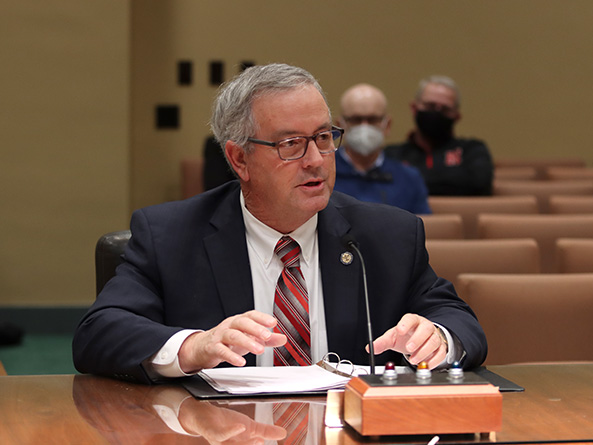Prairie dog management changes proposed
The Agriculture Committee heard testimony Jan. 18 on proposed changes to a law authorizing county boards to control black-tailed prairie dogs on property within the county.
The Black-Tailed Prairie Dog Management Act requires landowners to manage prairie dog colonies on their property to prevent the animals from expanding to adjacent property if a neighboring landowner objects to the expansion.
Under the act, which the Legislature passed in 2012, a landowner has 60 days to provide evidence to a county board that they have arranged for the management of a prairie dog colony. If they do not, the county or its agent may enter the property to take “appropriate management measures.” The landowner is responsible for management costs, which become a lien on the property.
Venango Sen. Dan Hughes, sponsor of LB712, said the act has been criticized for allegedly violating the property and due process rights of landowners and for failing to outline procedures for counties to use when adopting and carrying out a management plan.
“This bill eliminates those possibilities and the chance of abuse and will improve the administration of the act,” he said.
To date, only Sheridan County has adopted a management plan under the act, Hughes said, and neighboring landowners there settled a dispute about unmanaged prairie dogs before the county took further action.
Under LB712, an adjacent landowner could waive their objection to the expansion of a prairie dog colony onto their property. The bill also would repeal provisions under which landowners who are responsible for an unmanaged prairie dog colony could be found guilty of an infraction and fined up to $1,500.
Currently, a county’s failure to publish general notice of a prairie dog management plan — or to serve a landowner with individual notice of a plan — does not exempt a landowner from the law’s requirements. LB712 would repeal that provision and clarify that counties must serve individual notices by certified mail.
The bill also would authorize counties to assign certain aspects of prairie dog management plans, such as investigating complaints of unmanaged colonies.
Finally, LB712 would allow landowners to appeal certain county actions related to prairie dog management to any court with jurisdiction.
Andrew Dunkley testified in support of the bill on behalf of the Nebraska Farm Bureau. He said LB712 allows for “equitable treatment” for any landowner who chooses to have a managed black-tailed prairie dog colony on their property.
Jon Cannon gave neutral testimony on behalf of the Nebraska Association of County Officials. Cannon said the proposed changes would make the management plans, which he called a “valuable tool,” easier for counties to administer.
Cannon questioned, however, whether certified mail would be more effective than other methods when serving individual notices to affected landowners. He also said allowing landowners to appeal a county board’s prairie dog management actions in court could increase county expenses.
No one testified in opposition to the bill and the committee took no immediate action on it.


